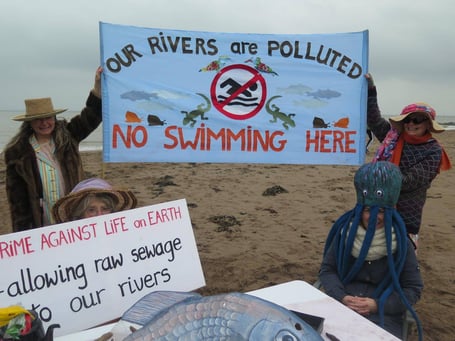Hundreds of incidents of sewage overflows have been recorded at popular tourist destinations along the West Somerset coast.
Last year, sewage was released in the Bristol Channel at Blue Anchor 125 times. The waters around Blue Anchor beach are designated as bathing waters by the UK government.
There were a further 32 incidents of discharges of a mixture of sewage and rainwater during periods of heavy rain at Minehead, and 12 at Porlock Weir.
Wessex Water manages most of the water and sewerage network across Somerset.
The firm oversaw a total of 803 sewage overflows into the sea last year, making it the sixth worst water company seafront polluter.
A spokesperson for the firm said: “Storm overflow discharges halved near designated bathing waters in our region in 2022, and this is down to last year’s dry weather as well as our £3 million a month investment in overflow improvement schemes.
“Clearly there’s more to do and we’re committed to continuing to reduce the frequency of discharges, starting with those that operate most frequently or have any environmental impact. We’re also planning to go even further and, if approved by our regulators, will invest more than £9 million per month from 2025.”
Wessex Water disputed the description of sewage being “dumped”, saying: “Storm overflows operate automatically during or after intense rainfall to prevent flooding of properties and are licensed by the Environment Agency.”
The campaign group, Surfers against Sewage, have warned of the dangers of polluted waters. They said: “Sewage pollution puts water users at risk of contracting harmful illnesses including viruses and antimicrobial resistant bacteria.
A report by the European Centre for Environment and Human Health (ECEHH) highlighted that sea bathers in the UK remain just as likely to become ill from seawater as they were in the 1990s.
It says poor water quality also prevents individuals enjoying the mental and physical wellbeing benefits associated from engagement with the ocean environment.”
The Wiveliscombe branch of Extinction Rebellion said private water firms were ‘putting people and wildlife second.’ In a statement a spokesperson for the group said: “Privatised water companies are beholden to their shareholders and the health of local people and wildlife comes a poor second. The government’s plan is slow, limited and underfunded. Water testing is left to local volunteers as the Environment Agency don’t have the staff.
“We are calling for the water quality of Somerset’s rivers to be taken seriously and made a top priority and we at WiveyXR will continue to campaign and draw attention to this issue.”
Last month the environmental group held a ‘poo party’ protest on Minehead beach, where they appealed for an end to ‘poo-lution.’
West Somerset MP, Ian Liddell-Grainger, has waded into the sewage row on a number of occasions. In October last year, he said Wessex Water had “an appalling record for dumping raw sewage into Somerset’s rivers.”
In his most recent intervention he told of his ‘fury’ over government plans to U-turn on proposals that would see water companies subject to unlimited fines.
In February Mr Liddell-Grainger said: “The public is infuriated by repeated failures in water quality linked to sewage discharges and expected to see water companies dealt with far more severely in future.”
“Last year the Government called for fines of up to £250 million to be imposed without mercy on corporate offenders after studies showed water quality adversely affected by effluent in all the country’s rivers and bathers reported scores of beach contamination incidents caused by raw sewage.
“To let them off lightly if - as is almost inevitable - they continue their polluting ways is disgraceful: it’s just throwing in the towel.
“The water companies are making a mint from something which falls out of the sky for free but are treating their environmental obligations with a degree of cynical contempt which is quite breath-taking.”
Last year the MP accused water companies of ‘sabotage’, saying: “Water companies which have preferred to reward shareholders rather than invest in upgraded treatment systems are in the process of sabotaging the British seaside’s newly-acquired reputation as a clean and safe place to holiday.”
The government’s 2022 Storm Overflows Discharge Reduction Plan aims to see discharges cut by 25 per cent by 2025, against 2020 levels, with a longer term goal to end storm overflows by 2050, outside of specific exceptions.
The report noted that the cost of upgrading Britain’s Victorian sewage infrastructure would cost hundreds of billions of pounds:
“Achieving complete elimination of storm overflows would bring benefits to the ecology of rivers, improvements to the natural environment, and protect public health where waterbodies are used recreationally.
“However, the benefits of implementing new policy must be considered against the costs they bring to the consumer, local residents, industry and environment.
“Large scale projects undertaken by water and sewerage companies are funded by investment from shareholders, borrowing and through customer bills. Therefore, a proportion of the costs would be passed onto water bill payers.
“The government has outlined ambitious proposals to reduce the frequency and duration of storm overflow discharges. This plan will revolutionise how water companies tackle the number of discharges of untreated sewage.”
To read the full report, visit the government website.





Comments
This article has no comments yet. Be the first to leave a comment.